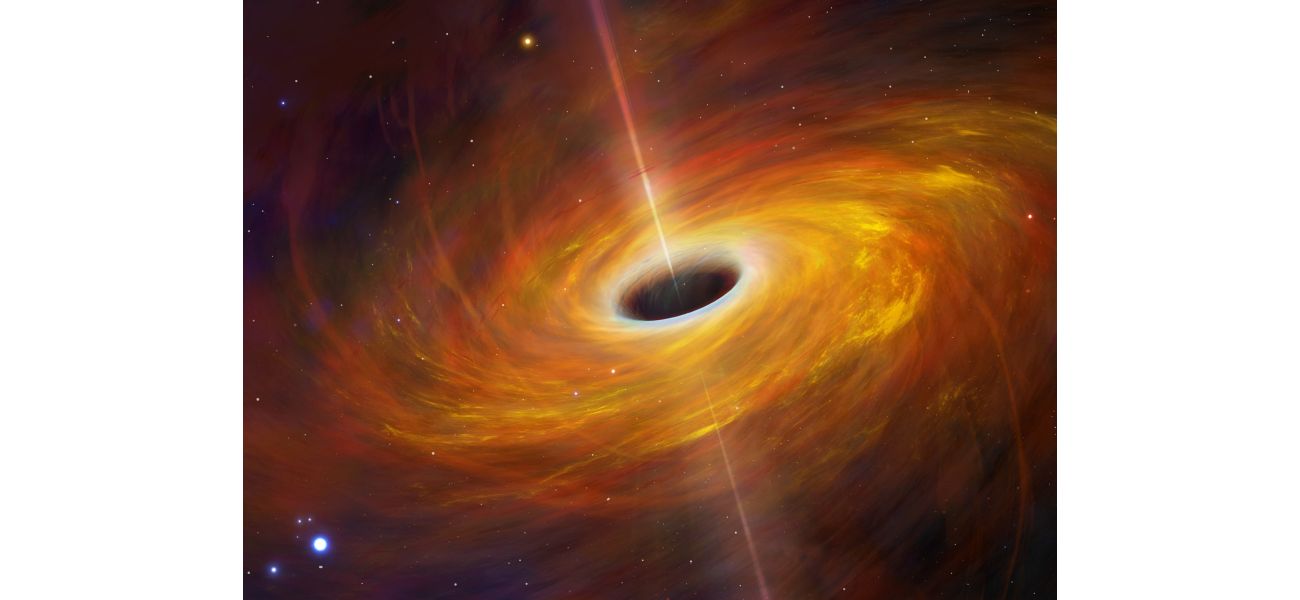The enigma of the black hole remains unsolved even after 85 years.
The enigma of black holes continues to be a major puzzle in the universe.
September 1st 2024.

It's been almost a century since the groundbreaking discovery of black holes, yet these enigmatic entities continue to baffle scientists to this day. It's no wonder that they are considered one of the greatest mysteries of our universe.
Throughout history, some of the greatest scientific minds, such as Albert Einstein and J. Robert Oppenheimer, have come up with their own theories about black holes. And today, we mark the 85th anniversary of the Oppenheimer-Snyder model, which demonstrated, for the first time, how black holes could form according to Einstein's field equations.
But how much do we really know about black holes? To shed some light on this topic, I spoke with Professor Nils Andersson, an expert in astrophysics and black holes at the University of Southampton. Professor Andersson emphasized the significance of Oppenheimer's findings, stating that even today, the paper's abstract could still be written with very little changes.
He added that the real impact of the paper was felt in the 1960s, during the renaissance of general relativity, which coincided with the birth of x-ray astronomy. However, despite these later discoveries, Professor Andersson believes that Oppenheimer and Snyder's initial findings did not contribute much to our understanding of black holes at the time.
But why is that? Professor Andersson explained that shortly after the paper was published, Oppenheimer shifted his focus to other aspects of relativity. Plus, black holes were not even understood or given a name until much later, in the 1960s.
In fact, it was Einstein himself who first predicted the existence of black holes back in 1916, with his general theory of relativity. However, it wasn't until 1967 that the term "black hole" was coined by American astronomer John Wheeler, after decades of being known as theoretical objects.
The first signs of a black hole were confirmed in 1964 by NASA, when a sounding rocket detected celestial sources of x-rays in the Milky Way. Scientists later discovered that these x-rays were coming from a bright blue star orbiting a strange dark object, further fueling their curiosity and research on black holes.
Fast forward to 2019, and we finally have the first-ever image of a black hole, captured by the Event Horizon Telescope. This groundbreaking image, taken from the center of the Messier 87 galaxy, shows the sudden loss of light particles and has opened up a whole new area of research on black holes.
And in 2021, the same black hole was captured in polarized light, revealing that its rings are magnetized. Professor Andersson believes that these advancements in technology and research have greatly deepened our understanding of black holes.
But there are still some fun facts about black holes that may surprise you. For instance, one theory suggests that if you were to fall into a black hole, you would stretch out like spaghetti, but unfortunately, you would not survive to witness this phenomenon. Another theory proposes that quantum effects would cause instant death by burning.
Contrary to popular belief, black holes don't actually suck things in. Instead, objects fall into them because they are pulled by gravity, just like how we are pulled towards the Earth. And if a star gets too close to a black hole, it gets torn apart.
In fact, it is estimated that there are 10 million to one billion black holes in our Milky Way galaxy alone, varying in sizes from absolute giants at the center of most galaxies to smaller ones that are just a few to ten times heavier than the sun.
But despite all the progress we have made in understanding black holes, there are still some mysteries left to uncover. Professor Andersson believes that through precise observations, particularly through gravitational wave astronomy, we may be able to gain a better understanding of these enigmatic entities.
He also mentioned that next-generation gravitational wave interferometers could potentially observe black hole collisions throughout the universe, providing us with valuable insights into their formation and evolution. It's an exciting prospect, and who knows what other secrets we may uncover about black holes in the future.
Throughout history, some of the greatest scientific minds, such as Albert Einstein and J. Robert Oppenheimer, have come up with their own theories about black holes. And today, we mark the 85th anniversary of the Oppenheimer-Snyder model, which demonstrated, for the first time, how black holes could form according to Einstein's field equations.
But how much do we really know about black holes? To shed some light on this topic, I spoke with Professor Nils Andersson, an expert in astrophysics and black holes at the University of Southampton. Professor Andersson emphasized the significance of Oppenheimer's findings, stating that even today, the paper's abstract could still be written with very little changes.
He added that the real impact of the paper was felt in the 1960s, during the renaissance of general relativity, which coincided with the birth of x-ray astronomy. However, despite these later discoveries, Professor Andersson believes that Oppenheimer and Snyder's initial findings did not contribute much to our understanding of black holes at the time.
But why is that? Professor Andersson explained that shortly after the paper was published, Oppenheimer shifted his focus to other aspects of relativity. Plus, black holes were not even understood or given a name until much later, in the 1960s.
In fact, it was Einstein himself who first predicted the existence of black holes back in 1916, with his general theory of relativity. However, it wasn't until 1967 that the term "black hole" was coined by American astronomer John Wheeler, after decades of being known as theoretical objects.
The first signs of a black hole were confirmed in 1964 by NASA, when a sounding rocket detected celestial sources of x-rays in the Milky Way. Scientists later discovered that these x-rays were coming from a bright blue star orbiting a strange dark object, further fueling their curiosity and research on black holes.
Fast forward to 2019, and we finally have the first-ever image of a black hole, captured by the Event Horizon Telescope. This groundbreaking image, taken from the center of the Messier 87 galaxy, shows the sudden loss of light particles and has opened up a whole new area of research on black holes.
And in 2021, the same black hole was captured in polarized light, revealing that its rings are magnetized. Professor Andersson believes that these advancements in technology and research have greatly deepened our understanding of black holes.
But there are still some fun facts about black holes that may surprise you. For instance, one theory suggests that if you were to fall into a black hole, you would stretch out like spaghetti, but unfortunately, you would not survive to witness this phenomenon. Another theory proposes that quantum effects would cause instant death by burning.
Contrary to popular belief, black holes don't actually suck things in. Instead, objects fall into them because they are pulled by gravity, just like how we are pulled towards the Earth. And if a star gets too close to a black hole, it gets torn apart.
In fact, it is estimated that there are 10 million to one billion black holes in our Milky Way galaxy alone, varying in sizes from absolute giants at the center of most galaxies to smaller ones that are just a few to ten times heavier than the sun.
But despite all the progress we have made in understanding black holes, there are still some mysteries left to uncover. Professor Andersson believes that through precise observations, particularly through gravitational wave astronomy, we may be able to gain a better understanding of these enigmatic entities.
He also mentioned that next-generation gravitational wave interferometers could potentially observe black hole collisions throughout the universe, providing us with valuable insights into their formation and evolution. It's an exciting prospect, and who knows what other secrets we may uncover about black holes in the future.
[This article has been trending online recently and has been generated with AI. Your feed is customized.]
[Generative AI is experimental.]
0
0
Submit Comment





